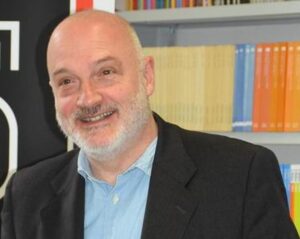How can universities move Virtual Exchange forward? Policies and strategies
Virtual Exchange: Next Steps in University Education
Virtual Event 3, 30 October 2020
The third Virtual Event in our series “Virtual Exchange: Next Steps in University Education” on Friday 30 October 2020, 12:00 PM (noon) CET focuses on:
How can universities move Virtual Exchange forward? Policies and strategies
Executive leaders in university education, internationalisation and digitalisation share ideas on the role of Virtual Exchange in university education in a panel presentation and interactive audience participation.
Registration for this event is now open. Please use this form to register your attendance.
Registration closes on 27 October.
Registered participants will receive the link for participating a few days before the event.
The full programme is available below.
If you have any questions, please contact us at: evolve@rug.nl.
Programme
Virtual Exchange: How can universities move Virtual Exchange forward? Policies and strategies
EVOLVE Virtual Event, in collaboration with NICE and Erasmus+ Virtual Exchange
Date: Friday 30 October 2020
Time: 12:00 PM (noon) – 1:00 PM CET
Registration
Registration for this event is now open. Please use this form to register your attendance.
Registration closes on 27 October.
Registered participants will receive the link for participating a few days before the event.
This is the final event in our series.
Recordings from the previous events may be accessed through the links below.
Previous event 1: Information and a recording of our first event “Implementing Virtual Exchange in European Higher Education: Different Approaches and Initiatives” can be found here
Previous event 2: Information and a recording of our second event “Virtual Exchange: Learning outcomes and students’ experiences” can be found here.
About the series Virtual Exchange: Next Steps in University Education
Three major European initiatives about Virtual Exchange, EVOLVE, Erasmus+ Virtual Exchange and NICE have come together to organise a series of virtual events on the current state and future directions of Virtual Exchange in Higher Education and its relevance in the light of the COVID19 pandemic.
In a global educational context which is increasingly characterised by an interest in internationalisation at home and considering the impact of the current COVID19 pandemic on international student mobility, Virtual Exchange offers universities a powerful complement to physical mobility programmes.
These events will offer members of the Higher Education community an opportunity not only to learn about the basic principles of Virtual Exchange, but also to become informed about different Virtual Exchange initiatives which are currently underway to promote this approach to learning in Europe and to provide evidence of its effectiveness in university contexts. The different sessions will therefore be of interest to university management, educational policy makers as well as university faculty members across disciplines.
The events include contributions by Virtual Exchange practitioners, university decision makers, faculty and students from each of the participating projects. This will provide participants with a comprehensive overview of this fascinating activity. The virtual events include opportunities for questions and answers on the themes which emerge during the event.
Key questions which will be discussed during these virtual events include the following:
- What is the current level of impact and up-take of Virtual Exchange in European higher education?
- In what ways is Virtual Exchange being implemented by European universities?
- What can research tell us about the contribution of Virtual Exchange to student learning?
- What barriers exist to the implementation of Virtual Exchange?
- What are students’ and teachers’ experiences of Virtual Exchange?
- How do university decision makers view Virtual Exchange? What role do they see it having in the future?





